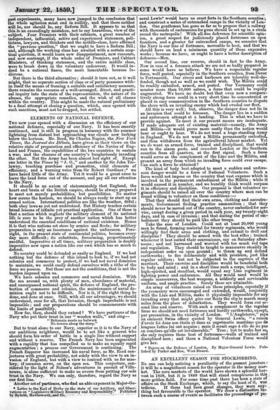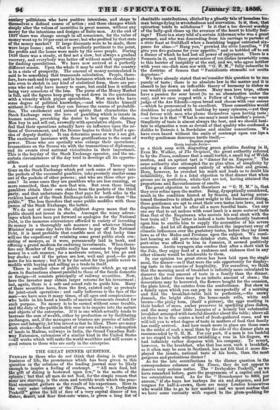IN EXCELLENT SEASON FOR STOCKJOBBING.
No one can help noticing a peculiarity of the present juncture : it will be a magnificent season for the operator in the money mar- ket. The corn markets of the world have shown a splendid har- vest in 1858, but it is 1859 that will stand conspicuous in this more golden field. For some time past there has been a state of affairs on the Stock Exchange, which, to say the least of it, was tedious. If there had been great changes, they were any- thing but favourable to the operator. We draw a distinction be- tween such a course of events as facilitates the proceedings of pa-
inniary politicians who have positive intentions, and shape to themselves a defined course of action ; and those changes which simply alter the values of securities in great masses, without any mercy for the intentions and designs of finite men. At the end of 1857 there was change enough in all conscience, for the value of money went up to 10 per cent or more; but who profited by that state of the money market? If large discounts were to be made, there were large losses ; and, what is peculiarly pertinent to the point,
the profits and the losses were made by the same people. During 1858 there was a steady, at first not a slow, but always a gradual recoveryl and everybody was better off without much opportunity
for dashing speculations. We have now arrived at a perfectly different season. Upon the whole it may be said that the country is in a state of prosperity. The amount of money accumulated is said to be something that transcends calculation. People there- fore, have cash and to spare; and in instances which we should hesi- tate even to sketch in any kind of statistical form, there are per- sons who not only have money to spare, but could lose it without being very conscious of the loss. The purse of the Money Market is full, and the figures keep going up and down in the quotations with a vivacity which piques speculation. Most men who have some degree of political knowledge,—and who thinks himself without it ?—fancy that they can foresee the course of probabili- ties. The excitement and animal spirits that characterize the Stock Exchange raise the love of gambling which is innate in human nature, provoking the desire to bet upon the chances. Men buy in and sell out, avowedly with speculative objects. They feel that their operations actually have an influence upon the ac- tions of Government, and the Bourse begins to think itself a spe- cies of deputy destiny. It can determineor war I son gre. The excitement increases with these gratifications to the sense of power. Those who are specially wise enlarge their operations; transactions on the Bourse vie with the transactions of diplomacy, and its events rival national vicissitudes in their importance. This is the heyday of the Stock Exchange operator, and the un- certain circumstances of the day tend to develope all its opportu- nities.
A word of caution may therefore not be amiss. These opera- tions on the Stock Exchange which put such sums of money into the pockets of the successful gamblers, take precisely similar sums out of the pockets of other persons ; and who are those other per- sons? In some cases they are gamblers who are less cunning, or more conceited, than the men that win. But even these losing gamblers obtain their own stakes from the pockets of the third party, and that unfortunate dupe that pays for both sides in the reckless hazard of the Stock Exchange table is no other than "the imblic." The less therefore that same public meddles with these games of the Stock Exchange, the better. We do not of course in the slightest degree mean that the public should not invest in stocks. Amongst the many advan- tages which have been put forward as apologies for the National Debt, is the immense convenience afforded to society of investing its money in a thoroughly safe manner ; and whatever blessed Minister may some day have the fortune to pay off the National Debt, it is most probable that sensible men at that lucky time will see the expediency of retaining some great public stook con- sisting of moneys, as it were, permanently laid in bank, and offering a grand medium for enduring investments. When there- fore any Member of the public really has occasion to deposit his money in a safe manner, for a moderate return, let him go and buy stocks ; and if the prices are low, well and good,—he gets more for his money; but it is by far safest for the public never to meddle with buying and selling as a trade in itself. • There is another class of public securities which go up and down in fluctuations almost parallel to those of the funds domestic or foreign—it consists principally of railway securities. Now, here the "wester may obtain larger returns for his investment; bat, again, there is a safe and sound rule to guide him. Many of these securities have, from the first, existed only as pretexts for joint-stock operations ; and sadly ludicrous is the face of the man—we have seen it many times, of all ages and complexions— who holds in his hand a bundle of ancient documents created for such purpose. No money is to be earned without some trouble, and the duty of the public in this case is to inquire into the nature and objects of the enterprise. If it is one which actually tends to increase the sum of wealth, either by production or by facilitating exchanges, and, if the managers or trustees are persons of intelli- gence and integrity, let him invest as fast he likes. There are many such stocks—the best conducted of our own railways; redemption of lands in Madras, railways in India, the Grand Canadian Rail- way Extension extensions of a similar kind in the United States —o11 works which will make the world wealthier and will secure a good return to those who are early in the enterprise.































 Previous page
Previous page